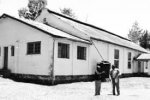Sanyatti
Member
When President F.W. de Klerk was in Kenya for a state visit in 1991, he flew to Eldoret to attend a church service at a Dutch Reformed Church where his grandfather, Rev Willem de Klerk, had ministered 50 years earlier.

''I am very impressed," he said after the service. "It is very encouraging to find Afrikaners living so far north in Africa."
Eldoret was the heart of the Boer community that settled in the area in the early 1900s when Kenya was a British colony.
The first Boers to settle at Eldoret were made up of Forty-seven families and had sailed to the Kenyan port of Mombasa in a ship called the Windhook, finally reaching Western Kenya in 1908 in a caravan of 42 wagons and 72 horses. They were followed by many more who travelled all the way from South Africa in Caravans.
At Eldoret They set up their own schools and churches and kept Afrikaans as their native tongue. They instituted their own brand of apartheid, cruelly oppressing the local blacks and imposing a code of strict racial separation.
At one point, the Boers in Eldoret numbered in thousands. In fact one Dutch Reformed Church branch at Eldoret alone , had a congregation of 600 Boers.
In 1991 , one African who trained as pastor at Dutch Reformed Church at Eldoret before independence, recalled how he was badly treated during his training by the South African missionaries who controlled the church.
"We were not allowed to sit on their chairs or enter into their houses," he said . "Even the house of the missionaries we were not allowed to enter. We had to stay outside." He also recalled being served tea by a missionary, not from a cup but from a tin.
The population of the Boers at Eldoret began dwindling after independence. In fact many has started leaving just before independence for fear of Black rule.

''I am very impressed," he said after the service. "It is very encouraging to find Afrikaners living so far north in Africa."
Eldoret was the heart of the Boer community that settled in the area in the early 1900s when Kenya was a British colony.
The first Boers to settle at Eldoret were made up of Forty-seven families and had sailed to the Kenyan port of Mombasa in a ship called the Windhook, finally reaching Western Kenya in 1908 in a caravan of 42 wagons and 72 horses. They were followed by many more who travelled all the way from South Africa in Caravans.
At Eldoret They set up their own schools and churches and kept Afrikaans as their native tongue. They instituted their own brand of apartheid, cruelly oppressing the local blacks and imposing a code of strict racial separation.
At one point, the Boers in Eldoret numbered in thousands. In fact one Dutch Reformed Church branch at Eldoret alone , had a congregation of 600 Boers.
In 1991 , one African who trained as pastor at Dutch Reformed Church at Eldoret before independence, recalled how he was badly treated during his training by the South African missionaries who controlled the church.
"We were not allowed to sit on their chairs or enter into their houses," he said . "Even the house of the missionaries we were not allowed to enter. We had to stay outside." He also recalled being served tea by a missionary, not from a cup but from a tin.
The population of the Boers at Eldoret began dwindling after independence. In fact many has started leaving just before independence for fear of Black rule.
